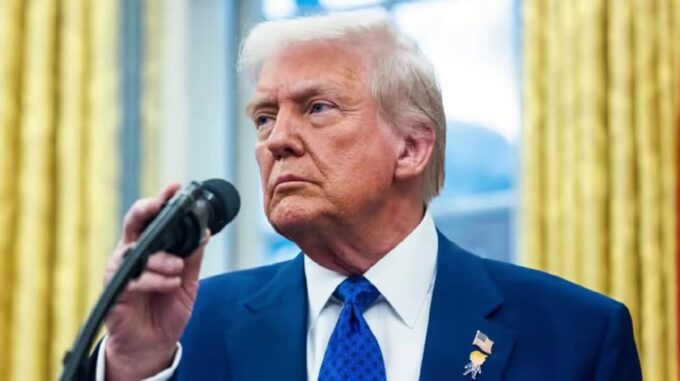According to information released by the reputable American publication The New York Times, a potentially secret and significant news event for the global economy and politics is emerging on the horizon — U

S. President Donald Trump is preparing to make an extremely important announcement regarding the signing of a trade agreement with the United Kingdom. According to sources within the newspaper, as early as Thursday, the White House chief intends to announce the conclusion of a new trade deal with a potentially key strategic partner — the United States. Details of this event remain entirely confidential at the moment, although Trump himself has already hinted at upcoming global agreements in his weekly post on the social media platform Truth Social. There, he stated that on Wednesday evening he will hint at "major changes" in bilateral trade relations. Most importantly, the American president did not specify which country or countries are planned to sign the new trade agreement. However, according to Trump, a "major press conference" will take place the next morning in the Oval Office, with an announcement about a "great and very respected country," which will be the first of many such steps. It is evident that this agreement is one of the first major steps in the post-pandemic period, especially after Trump implemented numerous tariffs and trade barriers with dozens of countries worldwide. Now, he seeks to reorient economic relations. It is known that previously, the president imposed high tariffs to protect domestic producers, notably in the automotive and steel industries. However, by the end of 2023, he publicly signaled the possibility of temporarily lifting or easing these restrictions to create a favorable environment for new trade deals. Analysts suggest that signing such an agreement with the United Kingdom could be quite a significant success, as both countries have long sought closer economic cooperation, expecting favorable terms for exchanging goods and services. At the same time, it is not yet known exactly what arrangements will be included in the final document. However, current information indicates that it involves reducing British tariffs on imported American cars and agricultural products, as well as removing UK taxes on American tech corporations. Another important aspect concerns tariff policy. On one hand, the UK was not subject to higher "reciprocal" tariffs because the U.S. buys more from Great Britain than it sells to it. Accordingly, Trump does not intend to lift the existing 10% tariff applicable to certain imported goods, including British equipment. On the other hand, regarding the higher level — the 25% tariff imposed on steel, aluminum, and automobiles — British officials insist on its removal. This issue remains open and, most likely, will be the subject of additional negotiations. Overall, experts note that this initiative is just part of a broader policy by the Trump administration aimed at concluding trade agreements with other key partners, such as India, Israel, South Korea, Japan, and Vietnam. They believe that Trump now has an opportunity to lay the groundwork for new arrangements, which, according to him, are likely to be more limited than traditional multilateral deals. Even during his first term as president, Trump signed several "mini-agreements," which typically covered only specific sectors of international trade. In general, for the UK, such an agreement could represent a significant step toward stabilizing and strengthening economic ties with the U.S., and for Prime Minister Kira Starmer, this diplomatic breakthrough would be a political achievement confirming his leadership position and the stature of a "star" among British politicians. Amid this news, it is also worth noting that today, the Trump administration is actively negotiating with several other countries, including Israel and India, and continues dialogues on new agreements with South Korea, Japan, and Vietnam. Experts also suggest that Trump may intend to announce the signing of shorter, more limited treaties aimed more at responding quickly to situational challenges than establishing a long-term, comprehensive trade policy, which many countries traditionally pursue through their parliaments. This is supported by several previous "mini-agreements" that have elevated the U.S. to a new level of trade arrangements in a short time during his tenure. It is clear that this move by Trump could reshape the global trading landscape, making it more flexible and fragmented, while providing the U.S. with agile tools for rapid and targeted political and economic maneuvers. What specific consequences this might have for the world economy and European trading partners remains uncertain for now. However, this direction has the potential to significantly alter the balance of power and game rules on the global market.

